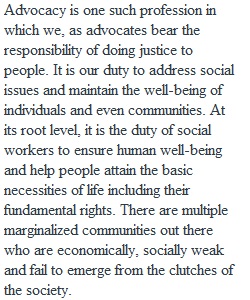


Q Quiz-1 1 Instructions Select 2 of the following questions and answer them. the questions are not to be answered in list format, you must write in paragraphs and your answers must be free of grammatical errors. Be sure to answer selected questions fully (partial responses will get partial credit). 1. Reading the positions of the various political parties, which do you most agree with? Which do you think best represents the values of the social work profession, as you understand them? Is there a difference between these two? 2. Is it acceptable for social workers to have different political philosophies and belong to different political parties? What are the implications for the profession if they do agree, or if they don't agree? 3. Why is advocacy an important function of social work? 4. What skills and abilities do you feel make for an effective advocate? Which do you currently possess, and which ones need additional training or practice? 5. What are the important differences between education, negotiation, and persuasion? Choose an example and apply each technique to a topic of interest to you. 6. How can living in the information age add to advocacy practice? What problems might emerge from living in this age? Submit your answers in the portal that states Submit Quiz answers here, located within this Module.
View Related Questions